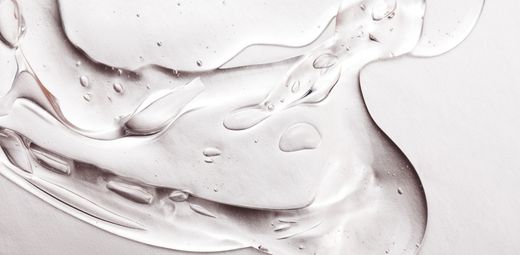In this article, I’m going to talk about one of the natures beautifying and health-giving molecules. Hyaluronic acid is the real deal when it comes to physical longevity, helping to quite literally build the components that make up the structures of our body.
If you suffer from dull, lacklustre skin that needs a little plumping boost, or you suffer from inflamed joints and general inflammation, or you’re simply looking for an anti-ageing kick, then hyaluronic acid is your new best friend.
Also, did I mention I love it? I’m not quite sure I did…
What is Hyaluronic Acid?
Hyaluronic acid is a plant-derived molecule (we also naturally produce it ourselves) which forms many components of connective tissue and helps to build a gelatinous structure around our cells to protect them1. It’s not a nutrient per se, but it exhibits nutrient-like qualities and benefits.
Hyaluronic acid primarily acts as a humectant2, meaning it draws water to the skin, which as we know helps to give skin that youthful, plumped dewy look. Hydration also helps to counteract inflammation, meaning that its calming benefits may help to support inflammatory skin conditions like acne, eczema and psoriasis.
I adore hyaluronic acid for many reasons, and without turning this article into a novel, let me share a few key reasons why I think you’ll love it too.
Hydration
When you think of hydration, think of hyaluronic acid. As noted, it is a humectant drawing water to the skin, meaning that if you’re looking to improve complexion or focus on anti-ageing or supporting general skin health, then consider including this in your daily routine.
You can add hyaluronic acid topically to the skin which does help with these benefits, however, hydrating the skin from the deeper layers of the epidermis adds another level of hydration that topical treatments simply cannot.
Inflammatory Skin Conditions
As mentioned previously, hyaluronic acid’s hydrating qualities help to reduce inflammatory skin conditions like acne, eczema and psoriasis.
Dry, dehydrated skin leads to irritation and irritation leads to inflammation. Hyaluronic acid has even been shown to help control and regulate sebum production. This means that it helps to balance out the oils in our skin that can build up and block pores, leading to…you guessed it….more inflammation.
It is important to get the sebum balance right when it comes to skin. Too little and the skin is irritated and unhappy. Too much and it can lead to congested and inflamed skin. Hyaluronic acid has been shown to regulate oil production to help reduce the chances of both outcomes from occurring3.
Joint Health
I have discussed the many beautifying properties of hyaluronic acid; however, this molecule also helps to support the structures that help our body to move freely without pain and discomfort.
Hyaluronic acid is found naturally within the structures that form our body and acts as a lubricant between joints, to help cushion and support ease of movement. Literature supports exciting and potential benefits on inflammatory joint conditions like osteoarthritis and rheumatoid arthritis4.
Several recent studies have also experimented with hyaluronic acid injections as a natural alternative to corticosteroid injections for osteoarthritis with promising results!5
May Soothe Acid Reflux Symptoms
Don’t let the name ‘hyaluronic acid’ scare you off when you think of acid reflux. It isn’t an acid in the ‘burning’ sense, the molecule has high uranic acid content which actually contributes to its soothing and lubricating properties.
Acid reflux is typically stimulated by contents of the stomach being regurgitated up and out of the stomach into the oesophagus, causing a burning discomfort sensation in the ribs and throat. One study even showed that hyaluronic acid actually helped soothe and repair the oesophageal lining post-acid-reflux attack. Another study unearthed promising results, showing that it was five times more likely to help support and lubricate the throat lining than a placebo! 6,7
Helps to Support Eye Health
If you suffer from dry mucosal linings whether it be digestive or other external membranes such as the eyes, then supplementing with hyaluronic acid may help to hydrate and lubricate these delicate and vulnerable parts of the body8.
Hyaluronic acid has been proven to help reduce the risk of eye infections and diseases such as Dry Eye Disease (DED). Administration of the molecule has been shown to add lubrication and comfort to dry eyes, helping to calm irritation and potential infections9.
Can Improve Bladder Health
If you suffer from interstitial cystitis, this may be for you.
Interstitial cystitis is an inflammatory condition of the bladder and can lead to chronic pain and discomfort in the lower abdomen and genitals10.
It can be a debilitating condition for many women and is frequently misdiagnosed in males.
Although complex and without a clear treatment plan, one of the more commonly discussed risk factors is an impaired epithelial lining, meaning the cells that make up the protective mucosal lining of the bladder and genitals are compromised. It could either be caused by a bacterial infection or a dry irritated lining. Hyaluronic acid can help to protect these mucosal linings and reduce irritation and inflammation to the affected areas11.
Wound Healing
Several studies have unearthed the potential benefits when it comes to wound healing and hyaluronic acid.
Hyaluronic acid is a natural compound that makes up many parts of the connective tissues that form the skin, and studies have shown that adding more of this molecule directly to the skin or via supplementation, can speed up the wound healing process12.
This is also great for skin pigmentation and scarring, helping to support the reduction of post-inflammatory acne hyperpigmentation (PIH) left from chronic acne.
My Advice
My primary advice when it comes to health, whether it be skincare, joint health, bladder or gut health, is that optimal health truly does start from within. Although you can topically add hyaluronic acid for its health-boosting benefits, for long-term prevention and maintenance, supplementing is recommended.
If you are looking to potentially supplement with hyaluronic acid, then consider trying our collagen supplement.
Our collagen supplement contains a generous dose of hyaluronic acid, which when taken together with collagen acts as a duo to help boost the above benefits! Our supplement also contains nourishing vitamin E and soothing aloe vera, making this supplement a fantastic all-around skin and joint health booster. It’s a win-win.


 Beauty
Beauty
 Bone Health
Bone Health
 Brain Health
Brain Health
 Energy
Energy
 Eye Health
Eye Health
 Gut Health
Gut Health
 Hair
Hair
 Hormonal Health
Hormonal Health
 Heart Health
Heart Health
 Immunity
Immunity
 Joints
Joints
 Menopause
Menopause
 Pregnancy
Pregnancy
 Kids
Kids
 Sleep
Sleep
 Stress & Mood
Stress & Mood




















